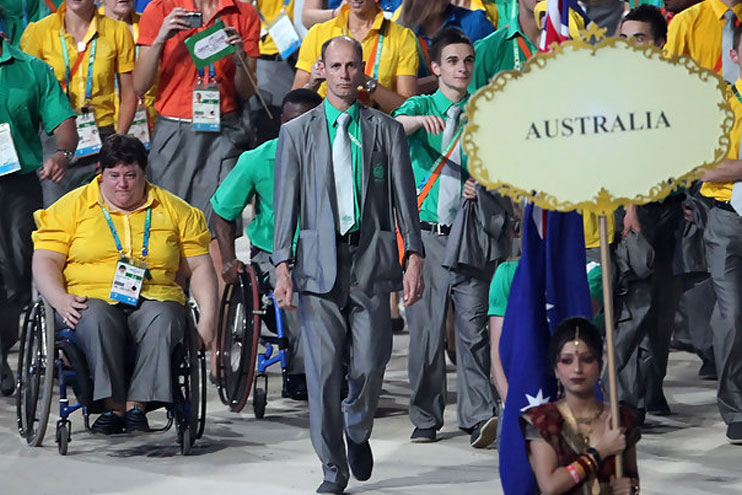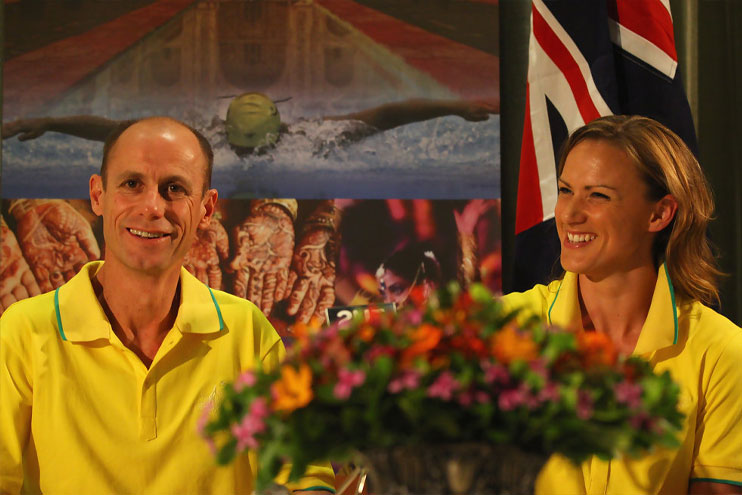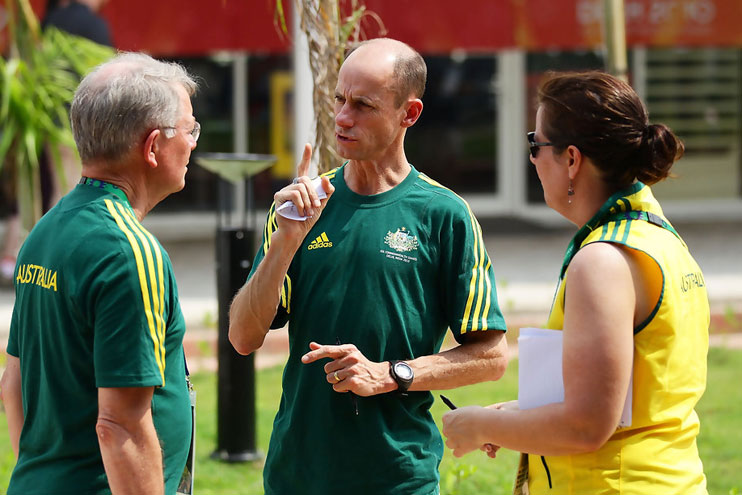
On the eve of the 10th anniversary of the 2010 Delhi Commonwealth Games, former marathon legend Steve Moneghetti speaks to Ian Hanson about the role he believed he wasn’t worthy to fill as the Australian Team’s Chef de Mission.
It was the start of a journey that would launch Steve Moneghetti as one of the true leaders in Australian sport, a man who would subsequently lead the Australian Commonwealth Games Team again in Glasgow in 2014 and to a spectacular home Games on the Gold Coast in 2018.
An athletes’ athlete, ‘Mona’ pounded his way onto four Commonwealth and four Olympic Games teams between 1986 and 2000 – running eight marathons for his country.
In 1986, when Moneghetti went to Edinburgh on his first Commonwealth Games Team he was close to being the last person picked.
He had just snuck under the qualifying time in the 10,000m and wasn’t supposed to run the marathon but he did and won the bronze medal behind Australia’s defending champion Rob de Castella.
“For me to be one of the last ones on in 1986 to then go to the other extreme and technically be the first person picked for Delhi as the Chef de Mission, to lead the team and to have been such an invisible member back in ’86, it had been an amazing journey,” recalled Moneghetti.
“One I could never have imagined in my lifetime that I could have gone from this quite little kid sneaking into a team and I never ever thought I would make a National track team, to suddenly leading that team in such a prestigious thing as the Commonwealth Games.”
Then Commonwealth Games Australia boss Perry Crosswhite made the approach to the Ballarat-based former marathon legend who had been the popular Mayor of the Games Village at the Melbourne 2006 Commonwealth Games.
“When Perry asked me and I said ‘I’m not worthy’ he said think about it… I reckon you are more than worthy,” said Moneghetti as he reflected on an appointment to lead the Australian team to a Games that would become the most controversial in Commonwealth Games history.
“I thought about it and accepted the role and I just tried to add value as the person who could interact with all the athletes as best I possibly could.
“It was quite late notice, just 12 months out and already it was a Games shrouded in controversy and for a job that what I initially thought ‘I’m not worthy’ to ‘I’ll give it a go’ before realising the complications of ‘OMG are these Games going to go on?’
“There were terrorism threats, concerns over money, tickets, all the controversy over whether the Games would actually ever come to fruition in the lead up and for me I can tell you one of the most important roles that I had leading in was actually ringing people (team members) and encouraging them to go.”

Steve with opening ceremony flagbearer Sharelle McMahon (CGA Archive)
Moneghetti would quickly realise the demands of being Chef de Mission would mean facing new challenges from those of being an athlete, now becoming a source of confidence to assure concerned athletes, parents and families by sharing his own experiences.
“So I rang athletes and some parents saying ‘I’m going… put your faith in me… I would not let your sons or daughters go to an unsafe environment… trust me’,” Moneghetti said.
“This was a combined initiative. I got the word there were some nervous athletes who were thinking of not going so we got on the front foot and Perry said to me ‘I reckon a call from you could get these people going.
“From my point of view it was an easy sell because the Commonwealth Games had been so significant for me.
“To ring up someone and say ‘this will be a life changing experience for you… trust me…you will regret it if you don’t go… will look after you and I will look after your kids and the experience will be a real positive one.
“I never once thought I wasn’t going so if I was going then why couldn’t I tell others that they should be going.
“I actually also had an experience with one particular athlete (who shall remain nameless) and this person did not want to race outside on the roads where they would be more of a target outside.
“They wanted to run on the track but I convinced them to run in a road event and they went on to have an excellent Commonwealth Games career.
“So they are the kind of conversations I was having leading in and that’s a part of the job no one needs to know or hears about at the time.
“That’s what you’ve got to do as the leader of the team.”

Steve speaks with team officials in the athletes’ village in Delhi (CGA Archive)
“You want to get a team over there to represent Australia and you want the athletes to be focused on their performance and not on things like terrorism, security… (and concerns) about whether the Games are going to happen,” Moneghetti said.
“I said I’ll look after all of that.. you (the athlete) just concentrate on your training, get yourself in good shape and go over there and represent your country the best you possibly can.
“That was the word I was getting out there, they were very appreciative of me contacting them personally and apart from one, who I don’t believe would have gone anyway, they all went… in the end it was a safe team.”
Steve Moneghetti certainly proved he was the man for the job, delivering all the faith that Perry Crosswhite had in him.
A leader who stood up for his athletes – a team that would go on to become one of the most successful in Australia’s decorated Commonwealth Games history winning 178 medals – 74 Gold, 55 Silver and 49 Bronze.
